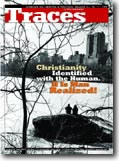
Traces N.11, December 2002
...Will You Ever Go In?By the spirit one goes to God… What a heart-breaking misfortune!” These words by Arthur Rimbaud contain the drama of human consciousness, especially for contemporary man. To the men of our time, God–according to the teaching of centuries of philosophers and religious masters–seems to be reachable only by way of a long and complicated spiritual journey. A spiritual path: that is what is needed in order to know the ultimate secret of reality, to embrace finally what corresponds to the vastness and profundity of the desire for truth and beauty that animates human life. Many men have walked along this path, leaving luminous–and even uncertain–signs of their conquests. At the end of an infinite series of veils and passages, one should finally find God. The majority of people remain a bit timorous and perplexed. And in the end, among the pressures of daily life, they stop raising for themselves the problem called God. Or else they tend to listen to the many false masters who lay out for them a more accessible spiritual path, one more comfortable, less demanding. And so, especially in times of insecurity and anxiety, many proposals for the soul are offered, many “ways” to God or to well-being or to balance, in an undifferentiated melting pot.
Rimbaud is right, it is a “heart-breaking misfortune,” because man is not made of pure “spirit,” he is not a being who lives from the clouds up. Every day, man has to deal with other men in flesh and blood, with things having to do with problems of survival and growth. If God were something that lies at the end of a difficult and confused spiritual journey, then He would be a sort of disaster and the search for Him would be an action full of obstacles, a heart-breaking contradiction to living–as though being close to God meant, in a certain sense, being less men.
The mystery of the Incarnation overturns this “normal,” prevailing way of thinking. The “yes” uttered by Mary at the Annunciation and then repeated every day in front of the presence of that Child is the first word of a new language with which men speak to God and of Him. It entails an unheard-of familiarity, a tenderness that shatters any rigidity in the human striving to reach a knowledge of God. He, the ungraspable prey of human imagination and spiritual ascesis, lets Himself be held in one’s arms like a baby, will eat at the table, will walk with friends, will let Himself be killed without putting up resistance, will come back to life so as not to leave His own and the world that seeks Him, alone and lost forever.
The silence of the shepherds, the Magi, the cultured and uncultured, the poor and rich, the simple-hearted, who drew near to the manger, is the most profound and authentic attitude in the face of a Mystery that strikes the heart and reason of humankind.
“If you don’t go back to being like children, you will never go in,” Claudio Chieffo reminds us in one of his songs. Just as two thousand years ago, the alternative arises immediately in front of that Child: between the wondering, touched silence of those who know they are receiving an exceptional, mysterious gift and the chatter of those who do not realize or don’t want to know. And today as then, those who reign over men’s thoughts are alarmed because a fact is happening that cannot be reduced to their plans and strategies for holding onto power. Because every type of human power that intends to use another for its own purposes–from the power exercised in the little sphere of personal life to that which wants to manage the thoughts and life of a people–needs a God who is far away, unreachable, and vague; who does not place anything in question; who does not cause the heart and life of anyone to leap with unexpected, profound freedom. But it happened, two thousand years ago, in Bethlehem. It continues to happen, in every part of the world. Recognizing it is a matter of simplicity of the heart. This is why “if you don’t go back to being like children…”